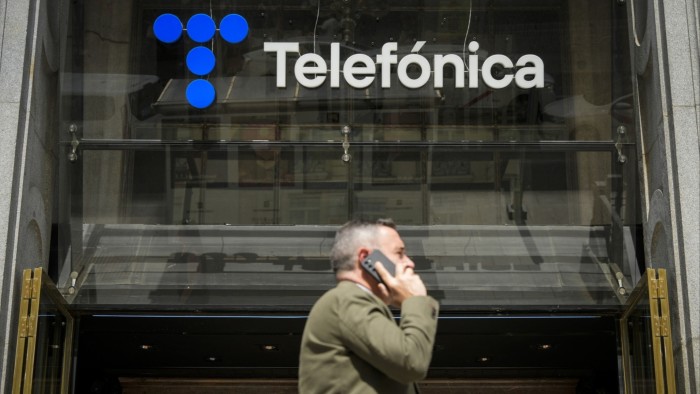Unlock the Editor’s Digest for free
Roula Khalaf, Editor of the FT, selects her favourite stories in this weekly newsletter.
Telefónica is prepared to invest in data centres and cyber security services in a bid to convince European regulators to approve telecoms mergers, as the Spanish company aims to lead consolidation on the continent.
The Madrid-based group is hoping that a pledge to make specific investments in key digital infrastructure will help convince the European Commission that fewer, larger telecoms operators can boost the bloc’s technological resilience, according to a person familiar with the matter.
Telefónica chair Marc Murtra has made European consolidation his top priority since being parachuted into the business this year by shareholders including the Spanish government.
The company, which operates in Spain, Germany and owns 50 per cent of UK operator Virgin Media O2, is one of several European telecoms groups pushing Brussels to allow four player markets to be reduced to three operators.
This consolidation has recently been permitted in the UK, where regulators approved Vodafone’s £16.5 billion merger with Three in December.
Telefónica is in the early stages of contemplating a move to acquire the 50 per cent of Virgin Media O2 it doesn’t already own from joint shareholder Liberty Global, according to three people familiar with the matter. The business has previously been valued at £31.4 billion. Telefónica declined to comment on its plans.
The EU is grappling with how to arrest its relative economic decline, presenting an opportunity for companies to push for more lenient competition regulation.
Murtra said in March that Europe’s position in the world would “continue to dwindle” should Brussels not heed calls for change.
In his report last year on the future of European competitiveness Mario Draghi recommended the bloc facilitate telecoms consolidation to create stronger players with a greater incentive to invest in improving connectivity.
The former president of the European Central Bank wants Brussels to define the telecoms market at the European level, rather than the member state level as it currently does.
Europe has 41 telecom operators with more than 500,000 customers, according to trade body Connect Europe. By contrast, the US has only five mobile operators with half a million customers or more, while China and Japan have four each.
The Trump administration’s hostility towards Europe has pushed the issue of cyber security up the agenda. On Tuesday, the head of the bloc’s cyber agency warned the EU was dependent on the US for cyber security, and must “step up” to help businesses tackle cyber threats.
A person familiar with Telefónica’s thinking said the company is prepared to invest in cyber security services to give European companies a local alternative to US and Israeli providers, which dominate the industry.
Enisa, the EU’s cyber security agency, has warned that there has been an increase in state-sponsored cyber attacks, backed by China and Russia.
Telefónica, which currently operates 15 data centres, is considering the new investments alongside its strategic review, which is expected to conclude in the autumn.
Additional reporting by Barbara Moens and Laura Dubois in Brussels
